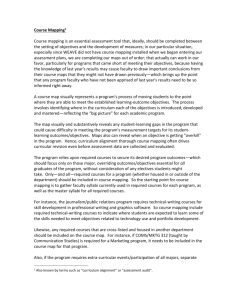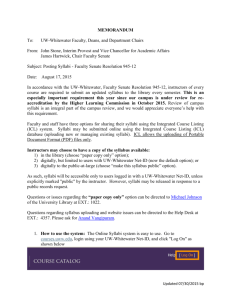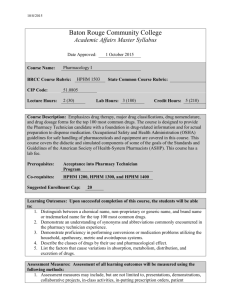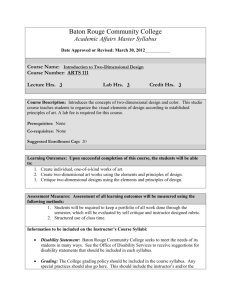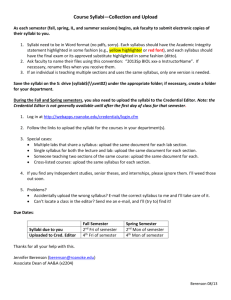SR 1402: A Resolution In Support Of Including an Academic Integrity
advertisement
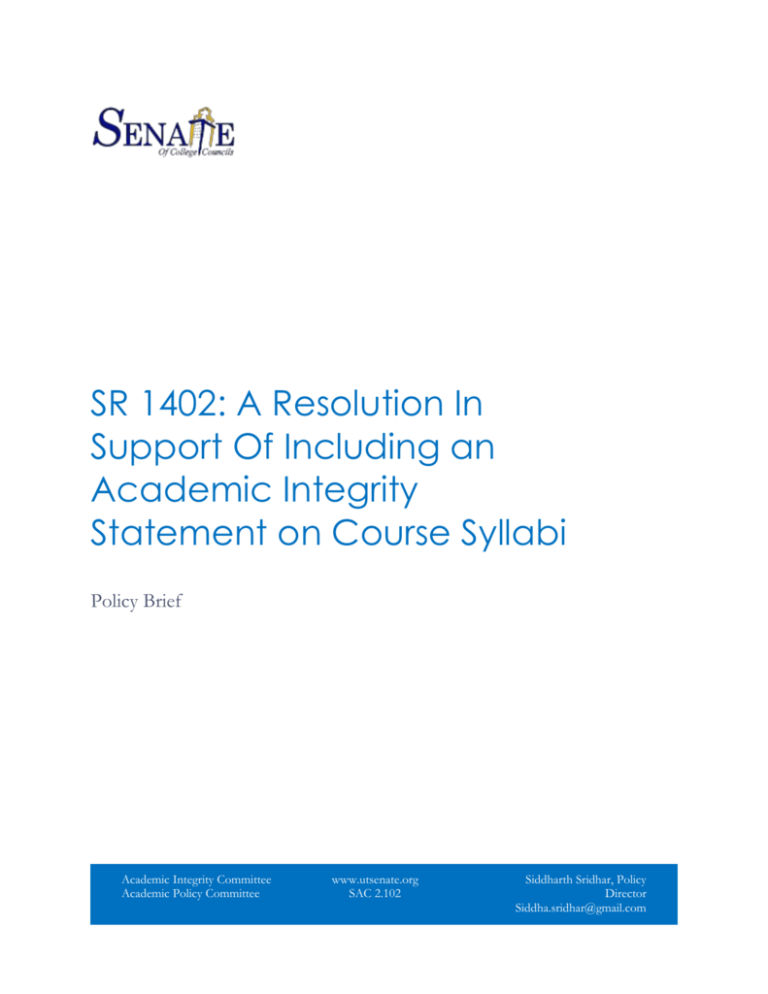
SR 1402: A Resolution In Support Of Including an Academic Integrity Statement on Course Syllabi Policy Brief Academic Integrity Committee Academic Policy Committee www.utsenate.org SAC 2.102 Siddharth Sridhar, Policy Director Siddha.sridhar@gmail.com Table of Contents I. Executive Summary ............................................................................................... 2 Current Policy Need for Change Recommended Policy II. Background ........................................................................................................... 3 Statement of Purpose Current Policy Necessity for Change III. Discussion ............................................................................................................. 3 Alternative to Current Policy Pros and Cons Recommendation IV. Implementation ..................................................................................................... 5 Cost Timeline V. Appendix A ............................................................................................................ 6 Executive Summary Current Policy The University of Texas at Austin General Information Catalog (GIC) provides a list of required items for all class syllabi. This list includes requirements for grading policy, office-hours information, and class overview. However, the requirements contain no mention of academic integrity. Current syllabi requirements exclude the University Honor Code and a definitive action plan for students questioned on the basis of their academic integrity. The updated honor code is as follows: “As a student of The University of Texas at Austin, I shall abide by the core values of the University and uphold academic integrity.” Need for Change The inclusion of the Honor Code on course syllabi across the university will help set the tone for classes and promote awareness of the new official Honor Code.1 Many of our comparison schools require professors to include the Honor Code in course syllabi along with resources to help students prevent issues with academic dishonesty. Functioning as written contracts between students and faculty, course syllabi provide a unique opportunity to promote academic integrity on campus. Requiring this change through Faculty Council would also raise awareness of the new Honor Code. This would create an expectation amongst professors and students, alike, to discuss academic integrity within the context of each course. Furthermore, a generalized syllabus statement that also includes a reference to Student Judicial Services would promote student awareness of university resources. If alleged of academic misconduct, a required syllabus statement would illustrate to students the expectations and formal procedures of the university. Recommended Policy Senate recommends the formulation of a brief, generalized syllabus statement, including the Honor Code and SJS resources (see Appendix A). As a requirement to course formation, this statement shall appear on all university syllabi. If passed, the policy proposal will be sent to the Office of the University Provost for university-wide implementation. 1 http://catalog.utexas.edu/general-information/academic-policies-and-procedures/class-syllabi/ SR 1402: A RESOLUTION IN SUPPORT OF INCLUDING AN ACADEMIC INTEGRITY STATEMENT ON COURSE SYLLABI 2 Background Statement of Purpose This legislation aims to uphold the values of this university by introducing a standard syllabus statement including both the updated University Honor Code and resources for students regarding academic dishonesty. Current Policy Currently, university policy regarding course syllabi makes no reference to academic integrity2. The university offers a multitude of services for students accused of academic violations such as Student Judicial Services. Conversations with students determined that while most students understand these services exist, they remain unaware of what the services offer. For example, students must navigate the Dean of Students website in order to see a list of procedures that follow an allegation of academic misconduct. Additionally, students and professors, alike, do not retain knowledge of the updated university honor code. Necessity for Change Currently, not all professors include the updated honor code on syllabi. Without a requirement to include academic integrity expectations on course syllabi, many professors remain unaware of the change to the Honor Code. By creating a syllabus statement, both students and professors will become well versed in current university policy. Students would feel more comfortable discussing academic violations and more knowledgeable as to what constitutes a university violation. The addition of the honor code and a reference to Student Judicial Services would increase transparency in academic expectations. As such, this policy supports the idea that students of the University of Texas at Austin should abide by the core values of the university. Discussion Alternative to Current Policy Addressing the absence of a policy regarding academic integrity and course syllabi, we consider a change in the GIC rules concerning course syllabi to mandate that all course syllabi carry a statement of the honor code and university academic integrity guidelines. 2 http://catalog.utexas.edu/general-information/academic-policies-and-procedures/class-syllabi/ SR 1402: A RESOLUTION IN SUPPORT OF INCLUDING AN ACADEMIC INTEGRITY STATEMENT ON COURSE SYLLABI 3 Several comparison schools have existing policies regarding the inclusion of academic integrity statements on syllabi. Texas A&M University’s Curricular Services3 states the “Aggie Honor Code” and mandates that a link to the “Aggie Honor System Office” must appear on syllabi.4 Similarly, the University of California-Berkeley requires every syllabus to include a section on “Permissible and Impermissible collaboration” and another on “Standards for academic honesty and penalties for infractions.”5 The University of Virginia also requires a section covering its honor system6. Additionally, some comparison universities strive to include more comprehensive statements that cover policies on academic dishonesty. The University of Colorado - Boulder recommends that all professors provide the following statement on their syllabi: “All students of the University of Colorado at Boulder are responsible for knowing and adhering to the academic integrity policy of this institution. Violations of this policy may include: cheating, plagiarism, aid of academic dishonesty, fabrication, lying, bribery, and threatening behavior. All incidents of academic misconduct shall be reported to the Honor Code Council (honor@colorado.edu; 303-7252273). Students who are found to be in violation of the academic integrity policy will be subject to both academic sanctions from the faculty member and non-academic sanctions (including but not limited to university probation, suspension, or expulsion). Other information on the Honor Code can be found at http://www.colorado.edu/policies/honor.html and at http://www.colorado.edu/academics/honorcode/.”7 Louisiana State University features a support system in regards to academic integrity. It includes the honor statement, potential consequences of academic misconduct, provides useful resources to questions of academic integrity, and stresses its “commitment to community.”8 Within the UT System, UT Pan-American mandates that each syllabus include a link to the Dean of Students, though it lacks a syllabus statement and Honor Code. As such, comparison institutions generally hold progressive views in communicating academic integrity to students and faculty. Holistically, UT Austin should adopt a syllabus statement inclusive of the established Honor Code and which makes references to various offices of student misconduct. Furthermore, by writing academic integrity into syllabi UT-Austin would place its core values - learning, discovery, freedom, leadership, individual opportunity, and responsibility - at the forefront of students’ academic experience. This raises awareness of proper scholastic conduct and allows UT to become proactive in mitigating issues relating to academic integrity by directly communicating its policies to students. http://curricularservices.tamu.edu/minimum-syllabus-requirements/ http://curricularservices.tamu.edu/minimum-syllabus-requirements/ 5 http://teaching.berkeley.edu/components-syllabus 6 http://www.scps.virginia.edu/uploads/SCPS-Syllabus-Template.docx 7 http://www.colorado.edu/policies/honor.html 3 4 8 http://www.utb.edu/vpaa/coe/Documents/Syllabi%202011-2012/Summer%20I%20Grad/EDLR%206370.pdf SR 1402: A RESOLUTION IN SUPPORT OF INCLUDING AN ACADEMIC INTEGRITY STATEMENT ON COURSE SYLLABI 4 Pros and Cons This policy option encourages discussion among students and professors about academic integrity in the classroom. It projects the values of the University Honor Code to all students and increases awareness of the importance of Student Judicial Services. Based off of the comparison school data, we find that numerous institutions have already implemented mandatory syllabi statements, which showcase their integrity policies. The UT Honor Code serves to unite students and promote student responsibility; this policy initiative intends to further that mission. Additionally, the schools listed above provide students with valuable information regarding their options if alleged of scholastic misconduct. This policy option does not, however, standardize what constitutes academic misconduct within any given course at UT. Hopefully, with the implementation of this syllabus statement, student and faculty would be motivated to consider the confines within which a student may work without violating academic integrity. As the syllabus statement would be included on all university syllabi, it would provide an opportunity from which professors could define cheating for their specific discipline of coursework. Recommendation Currently, UT Austin offers no mention of academic integrity within its established guidelines for syllabi formation. Through a standardized syllabus statement, the university can effectively communicate its core values to students and professors, alike. Furthermore, a concise statement allows for visibility as well as memorability amongst student populations. Implementation Cost If S.R. 1402 is passed, the Faculty Council and Educational Policy Committee will vote to amend the requirements for syllabi for the coming semesters to include the honor code, campus resources, and contact information for Student Judicial Services. The authors will work with Senate’s Legislation Implementation Coordinator to arrange meetings with administrators and follow through with the Provost’s office to create the statement itself. Timeline Both of the aforementioned university committees would discuss S.R. 1402 during the Fall Semester allowing for implementation as soon as Fall 2016. Senate representatives to the committees would advocate for its passage, and assure that original message behind the piece be either improved or unchanged. Acceptance by both committees would provide faculty concurrence to the inclusion of an academic integrity statement on course syllabi. For this to be passed, and for a statement to be SR 1402: A RESOLUTION IN SUPPORT OF INCLUDING AN ACADEMIC INTEGRITY STATEMENT ON COURSE SYLLABI 5 generated by the Provost’s office, alteration to current syllabus requirements may be acquired by the Fall 2015 semester. Appendix A The following link provides students with a flowchart explaining academic integrity policy and the procedure by which students follow up with integrity claims: http://deanofstudents.utexas.edu/sjs/downloads/discproc_academic.pdf SR 1402: A RESOLUTION IN SUPPORT OF INCLUDING AN ACADEMIC INTEGRITY STATEMENT ON COURSE SYLLABI 6
